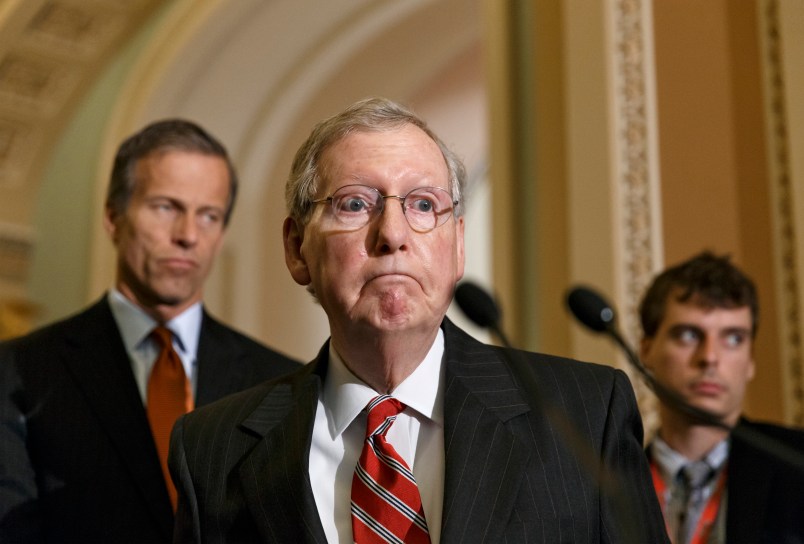How frequently Republicans talk about Obamacare in the run-up to the 2014 midterms remains an unanswered question. Most agree the politics of Obamacare seem to be shifting, but Republicans still might bet that riling up their base with anti-Obamacare rhetoric is enough to catapult them into control of the Senate.
But at some point, perhaps during a candidate debate in the coming months, they should be obligated to answer serious questions about their opposition to the law.
Here’s what TPM would ask, given the chance. Tough questions for Democrats will follow later this week.
The first, and most obvious, question is simply whether they support repealing Obamacare. From there, two lines of inquiry emerge.
Three Questions For Republicans Who Want To Repeal The Affordable Care Act
1. How would any alternative policy account for the millions of previously uninsured people who have gotten health coverage under Obamacare?
This is the reality that is forcing Republicans to reconsider their absolutist opposition to the law. Though they are still trying to chip away at the raw totals, sometimes disingenuously, the fact remains: Millions of people who previously did not have insurance now do. Depending on your source, that number could be 10 million or more, through subsidized private insurance and expanded Medicaid.
Repealing the law would presumably do away with the coverage that those people have only recently received. The starting point for any discussion of a GOP alternative must start with: What happens to them?
2. Do you think covering the uninsured should be the goal of federal policy? If so, how would your alternative policy achieve that and keep insurance costs stable without an individual mandate?
If Republicans want to get rid of the law, they should answer a basic question: Even if they oppose its mechanics, did they approve of Obamacare’s goal of insuring the uninsured?
No politician running for election is likely to say that they oppose covering uninsured. So what then? If that’s the case, they need to explain how they’d do that without Obamacare’s most-hated provision: the individual mandate. Republicans have voted multiple times to repeal it, and every time, insurance companies warned that repeal could be disastrous to the market. In a couple of states that adopted the law’s insurance reforms in the past without a mandate, they’ve have seen higher prices.
Obamacare helped extend coverage by eliminating discrimination against preexisting conditions. Setting aside the GOP’s favored high-risk pools, which have been called into question by research, they need to explain how they would make the finances work while covering that key population without a mandate. Senate Republicans took a stab at it and came out with something that sounded a lot like a mandate.
3. You have criticized President Obama for canceled policies under Obamacare. If your alternative policy is intended to expand health coverage, how would it achieve that without causing the same kind of disruption in the market?
This was another problem with the Senate Republican plan. The GOP got extensive political mileage out of the canceled health policies brought on by Obamacare and the administration’s bungled response. But that’s because, by definition, any reform is going to upset the status quo, and that can be politically difficult.
The Senate GOP’s proposal ran into the same problem, according to health policy experts, because it changed the tax code regarding health insurance. If Republicans are serious about an Obamacare alternative, they need to explain how they could avoid disruption — or be honest that it is inevitable in reform.
Three Questions For Republicans Who Don’t Want To Repeal The Affordable Care Act
1. Would you oppose continued efforts by Republican leadership to repeal Obamacare or intentionally undercut its effectiveness?
House Republicans have stepped away from the repeal game since taking it to the logical extreme during the government shutdown. But it’s still present in their rhetoric and — if the GOP were to take the Senate — it’s not hard to imagine that the party’s legislative agenda could consist of nothing more than weekly votes to repeal Obamacare. There are other ways to stymie the law without repealing it in its entirety, like nixing the individual mandate, and the GOP has pursued those options as well.
So if a candidate says they doesn’t support repealing Obamacare, then that candidate should go on the record about whether they would be party to any continued shenanigans by Republican leadership.
2. What serious improvements to the law are you ready to propose that could win support from congressional Democrats and the White House?
The White House has acknowledged that Obamacare could use improvements. But there is a fundamental difference between realistic changes and the legislative trolling that has largely consumed the GOP to date. Some serious ideas have been floated — like creating a cheaper level of coverage or repealing the employer mandate — and could likely win support from some Democrats.
But a recognition that Obamacare is going to remain law is necessary before those conversations can happen.
3. If your state has not expanded Medicaid under the law, what are you willing to do to persuade GOP state leaders to accept expansion?
Medicaid expansion is already a tricky issue for Republicans. As The Washington Post’s Greg Sargent has documented, some in the GOP serve up a bit of word salad when asked about it by reporters. However unpopular Obamacare might be, poll after poll has found that even residents of deep-red states support expanding Medicaid to cover low-income adults.
Some GOP governors have gotten onboard, but more than 20 have not and 5 million people have fallen in a coverage gap. So if Republicans are going to say they want to keep the law, it stands to reason that they’d want it to work as well as it can for their state. Getting their state officials to expand Medicaid would go a long way toward that goal, and states have proposed a number of alternatives that are more palatable for conservatives.









